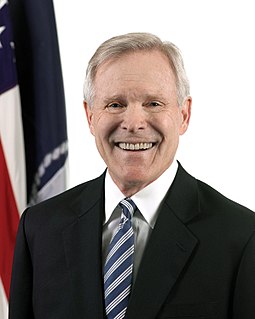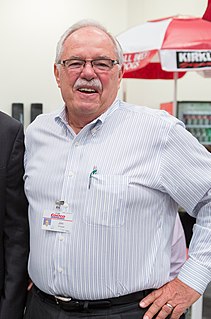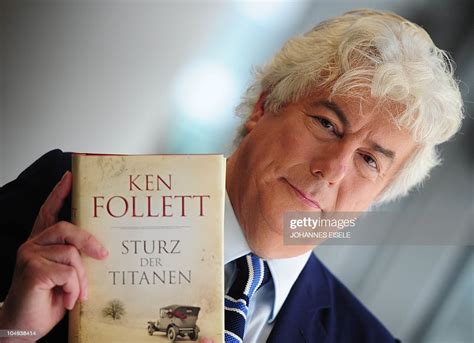Top 1200 Fuel Prices Quotes & Sayings - Page 3
Explore popular Fuel Prices quotes.
Last updated on December 18, 2024.
No politician can praise unemployment or inflation, and there is no way of combining high employment with stable prices that does not involve some control of income and prices. Otherwise the struggle for more consumption and more income to sustain it-a struggle that modern corporations, modern unions and modern democracy all facilitate and encourage-will drive up prices. Only heavy unemployment will then temper this upward thrust. Not many wish to confront the truth that the modern economy gives a choice only between inflation, unemployment, or controls.
In the richest country in the history of the world, this Obama economy has crushed the middle class. Family income has fallen by $4,000, but health insurance premiums are higher, food prices are higher, utility bills are higher, and gasoline prices have doubled. Today more Americans wake up in poverty than ever before.
We only gain collectively by acting now. We gain by one day not having to pay a thing for fuel. We gain by having cleaner air, water, and food so that we are healthier and our health care costs come down. We gain by deflating the global fossil fuel markets that drive much of the conflict around the world.
It's estimated that about 30 percent of the increase in grain prices could be attributed to the decision to embrace biofuels, particularly corn-based ethanol. It has done nothing for climate change and the business is in real trouble now with the collapse of oil prices. It's completely dependent on a dollar subsidy and tariff from the government.
It's not just the kid who's spent every penny from his job to upgrade his car to tell the world he cares about sports cars, it's also the person driving around in a fuel-conscious hybrid electric car, because it's more a message to the world than an effective means of saving fuel, to be quite honest.
The mere possession of monopoly power, and the concomitant charging of monopoly prices, is not only not unlawful, it is an important element of the free-market system. The opportunity to charge monopoly prices - at least for a short period - is what attracts 'business acumen' in the first place; it induces risk taking that produces innovation and economic growth.
In the ten years leading up to 2013, quinoa prices nearly tripled on the back of skyrocketing international demand for the latest 'superfood'. The grain had traditionally been cultivated in the high Andean plateau, principally for household consumption. But as prices rose, farmers' incentive to sell it as a cash crop grew.
Who can complain about the price that Google is charging you? Or who can complain about Amazon's prices; they are simply lower than the competition's. And that's why I think we need to shift back to a more Brandeisian conception of antitrust, where we consider values other than simply efficiency and low prices.
Women oftentimes are the ones making those economic decisions, sitting around the kitchen table and trying to figure out how to pay for rising gas prices or food prices or the health insurance costs. And I think that they see where they expect their leaders in Congress to also make those tough decisions.
1973 was the first gasoline crisis in the world. That year, I designed the first aerodynamic truck, eating 40 percent less fuel. I put it on exhibit everywhere. It was 30 years ahead of its time. Nobody is building it today, and everybody still has problems with their boxy cars and trucks eating up fuel.
The effect of metals speculation was to push up the prices that China had to pay to countries like Australia. This squeezed China. Once the speculative demand ended, all of a sudden the added production facilities that had been brought into production by the high prices went out of production again, and there was a glut.
It is an unfortunate fact that great and foolish excess can come into prices of common stocks in the aggregate. They are valued partly like bonds, based on roughly rational projections of use value in producing future cash. But they are also valued partly like Rembrandt paintings, purchased mostly because their prices have gone up, so far.
The Reichswirtschaftsministerium ('Reich Ministry of Economic Affairs') tells the shop managers what and how to produce, at what prices and from whom to buy, at what prices and to whom to sell. It assigns every worker to his job and fixes his wages. It decrees to whom and on what terms the capitalists must entrust their funds. Market exchange is merely a sham.
People are, by and large, quite poor at judging correct absolute values but are astute about determining relative values. Psychologists call this coherent arbitrariness, which suggests that individuals are coherent when they compare prices on a relative basis but arbitrary when those prices are considered versus fundamental value.
Exporting oil would not drive up prices at the pump. American drivers buy refined products, which the U.S. already exports. Many studies - from a range of institutions and government agencies, including the Congressional Budget Office and the Energy Information Administration - have shown that lifting the export ban could actually lower gas prices.
We promote new fossil fuel infrastructure, from airport expansion and coal mines in the U.K. to oil pipelines in the U.S. Investments are meant to build and secure our shared future - but all these fossil fuel investments are directly fuelling the climate crisis that threatens to undermine that future.
There is no doubt that the Fed's large-scale asset purchases have caused major increases in a number of asset prices in the economy. This is especially true of mortgage backed securities and corporate bonds, and quite possibly of equities as well. For those people and institutions holding those things, the run up in prices has been a wealth bonanza.
Natural gas obviously brings with it a number of quality-of-life environmental benefits because it is a relatively clean-burning fuel. It has a CO2 footprint, but it has no particulates. It has none of the other emissions elements that are of concern to public health that other forms of power-generation fuels do have: coal, fuel oil, others.
We've done price elasticity studies, and the answer is always that we should raise prices. We don't do that, because we believe -- and we have to take this as an article of faith -- that by keeping our prices very, very low, we earn trust with customers over time, and that that actually does maximize free cash flow over the long term.























































